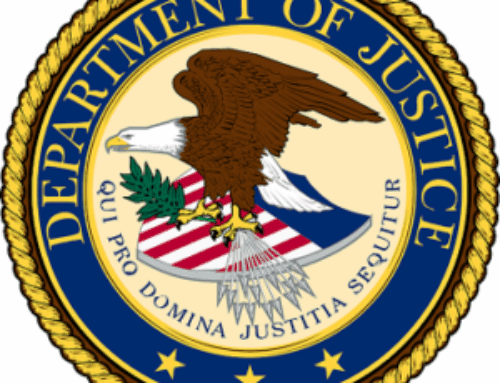As we noted in our Top 10 False Claims Act Recoveries post, it was another big year of recoveries under the False Claims Act. As usual, the majority of recoveries occurred in cases involving healthcare fraud.
As the Department of Justice (DOJ) just reported in its annual roundup of False Claims Act successes, of the $2.9 billion the government and whistleblowers recovered this past fiscal year (ending September 30), more than $1.67 billion (58%) came from matters involving healthcare fraud. Since 1986, when the False Claims Act was amended to add stronger incentives and protections for whistleblowers, the aggregate percentage of cases involving healthcare fraud is even higher — 70% (or $54 billion of the roughly $78 billion in total recoveries over this period).
Unsurprisingly, four of this past year’s Top-10 healthcare fraud recoveries involved violations of the Anti-Kickback Statute, which prevents making or receiving any form of consideration to induce patient referrals. Going after healthcare kickbacks has been a perennial DOJ enforcement priority. So has taking action against health care providers, pharmaceutical companies and pharmacies that contributed to and exacerbated the opioid crisis. Two of the Top-10 listings involved opioid-related fraud.
Rounding out the Top-10 listing are cases involving Medicare Advantage (Risk Adjustment) fraud, another hotbed for DOJ enforcement, and a variety of classic healthcare fraud cases involving overbilling Medicare or billing Medicare for services not provided. Not included in the listing is the $150 million jury verdict last June against Johnson & Johnson subsidiary Janssen Products for illegally promoting and marketing its HIV/AIDS drugs Prezista and Intelence. The decision is on appeal and if upheld could result in total damages ultimately exceeding $1 billion.
As expected, all but three of the Top-10 recoveries were originated by whistleblowers under the qui tam provisions of the False Claims Act. This percentage of whistleblower-led recoveries is consistent with the dominant role whistleblowers have played since 1986 in enforcing the False Claims Act. Of the $78 billion the government has recovered over this period, roughly $55 billion (71%) has come from matters originated by whistleblowers. Whistleblowers received roughly $9.5 billion in awards during this period.
Finally, Constantine Cannon is especially pleased to note that two of this past year’s Top-10 cases were originated by whistleblowers the firm represented — Independent Health (No. 6) and DaVita (No. 9).
With all that said, here is our Top-10 listing of False Claims Act healthcare recoveries in 2024 (by calendar year).
No. 1: Endo Health ($476M). On February 29, Endo Health Solutions, which is in bankruptcy, agreed to pay roughly $476 million to settle DOJ charges of violating the False Claims Act and the Federal Food, Drug and Cosmetic Act through its sales and marketing of the opioid drug Opana. Specifically, the company allegedly used a marketing scheme that targeted healthcare providers the company knew were “pill mill” prescribing Opana for non-medically accepted indications. In addition to the civil settlement, the company was hit with a criminal fine of roughly $1 billion and an additional $450 million in criminal forfeiture, representing the second-largest set of criminal penalties ever levied against a pharmaceutical company.
No. 2: Teva ($450M). On October 10, New Jersey-based Teva Pharmaceuticals agreed to pay $450 million to settle DOJ charges of violating the False Claims Act and Anti-Kickback Statute by (i) paying Medicare patient copays for its multiple sclerosis drug Copaxone to steer patients to the drug while raising its price, and (ii) conspiring with other generic drug makers to fix prices for certain generic drugs, including its widely-used cholesterol drug pravastatin.
No. 3: Rite Aid ($410M). On July 10, Rite Aid Corporation and 10 subsidiaries and affiliates agreed to pay $7.5 million and up to roughly $402 million in unsecured claims in Rite Aid’s bankruptcy to settle DOJ and whistleblower charges of violating the False Claims Act and Controlled Substances Act by dispensing hundreds of thousands of prescriptions for controlled substances — including highly addictive oxycodone and fentanyl — that lacked a legitimate medical purpose and/or were not issued in the usual course of professional practice. The allegations originated in a whistleblower lawsuit filed by Rite Aid pharmacy employees Andrew White, Mark Rosenberg and Ann Wegelin, who collectively will receive a whistleblower award of 17% of the government’s total False Claims Act recovery.
No. 4: Rite Aid ($121M). On July 10, Rite Aid Corporation and certain subsidiaries agreed to pay $101 million and up to $20 million in unsecured claims in Rite Aid’s bankruptcy to settle DOJ and whistleblower charges of failing to properly report to Medicare drug rebates it received from manufacturers, characterizing them instead as bona fide service fees. The allegations originated in a whistleblower lawsuit filed by former Rite Aid subsidiary employee Glenn Rzeszutko who will receive an undisclosed whistleblower award from the proceeds of the government’s recovery.
No. 5: Walgreens ($107M). On September 13, Illinois-based Walgreens agreed to pay roughly $107 million to settle DOJ and whistleblower charges of violating the False Claims Act by billing Medicare/Medicaid for prescriptions it processed but that patients never picked up. The allegations originated in a whistleblower lawsuit filed by former Walgreens pharmacy manager Steven Turck who received a whistleblower award of roughly $15 million from the proceeds of the settlement.
No. 6: Independent Health ($98M). On December 29, Buffalo-based Independent Health agreed to pay up to $98 million to settle DOJ and whistleblower charges of violating the False Claims Act by submitting invalid diagnosis codes to increase the payments the company received from Medicare for its Medicare Advantage Plan enrollees. The allegations originated in a whistleblower lawsuit filed by Teresa Ross, a former employee of Group Health Cooperative (now Kaiser). Constantine Cannon represented Ms. Ross who will receive a whistleblower award of at least $8.2 million from the proceeds of the settlement.
No. 7: Oak Street ($60M). On September 18, Chicago-based Oak Street Health agreed to pay $60 million to settle DOJ and whistleblower charges of violating the False Claims Act and Anti-Kickback statute by paying kickbacks to third-party insurance agents in exchange for recruiting seniors enrolled in or eligible for Medicare Advantage to Oak Street Health’s primary care clinics. The allegations originated in a whistleblower lawsuit filed by Joseph Stinson who received a whistleblower award of $9.9 million from the proceeds of the government’s recovery.
No. 8: QOL Medical ($47M). On November 15, Florida-based pharmaceutical company QOL Medical and its CEO Frederick Cooper agreed to pay $47 million to resolve DOJ and whistleblower charges they violated the False Claims Act and Anti-Kickback Statute by providing patients free breath testing services to induce them to purchase QOL’s drug Sucraid. The allegations originated in a whistleblower lawsuit filed by former QOL employees Elizabeth Allen, Lauren Canlas, Donald Johnson and Stacey Adams, who collectively received a whistleblower award of roughly $8 million from the proceeds of the government’s recovery.
No. 9: DaVita ($34.5M). On July 18, Denver-based DaVita Inc. agreed to pay roughly $34.5 million to settle DOJ and whistleblower charges of violating the False Claims Act and Anti-Kickback Statute by (i) paying kickbacks to a competitor for referrals to DaVita’s former pharmacy services subsidiary DaVita Rx, and (ii) paying kickbacks to nephrologists and vascular physicians for patient referrals to DaVita dialysis centers. The allegations originated in a whistleblower lawsuit filed by former Chief Operating Officer of DaVita Kidney Care Dennis Kogod. Constantine Cannon represented Mr. Kogod, who received a whistleblower award of roughly $6.4 million from the proceeds of the government’s recovery.
No. 10: Silver Lake ($30.6M). On January 16, New Jersey-based Silver Lake Hospital and certain hospital investors agreed to pay $30.6 million to settle DOJ charges of violating the False Claims Act and Federal Debt Collection Procedures Act by claiming excessive cost outlier payments from Medicare for fraudulent money transfers by the hospital to investors. With respect to the cost outlier overpayments, which are designed to supplement Medicare payments for unusually high costs of care, the government alleged Silver Lake improperly distorted the cost outlier payment system by rapidly increasing its charges well in excess of any increase in its costs.
If you would like more information on any of these settlements or would like to learn more about what it means to be a whistleblower under the False Claims Act, please do not hesitate to contact us. We will connect you with an experienced member of our whistleblower team for a free and confidential consult.
Read Top 10 False Claims Act Recoveries in Healthcare for 2024 at constantinecannon.com






Leave A Comment